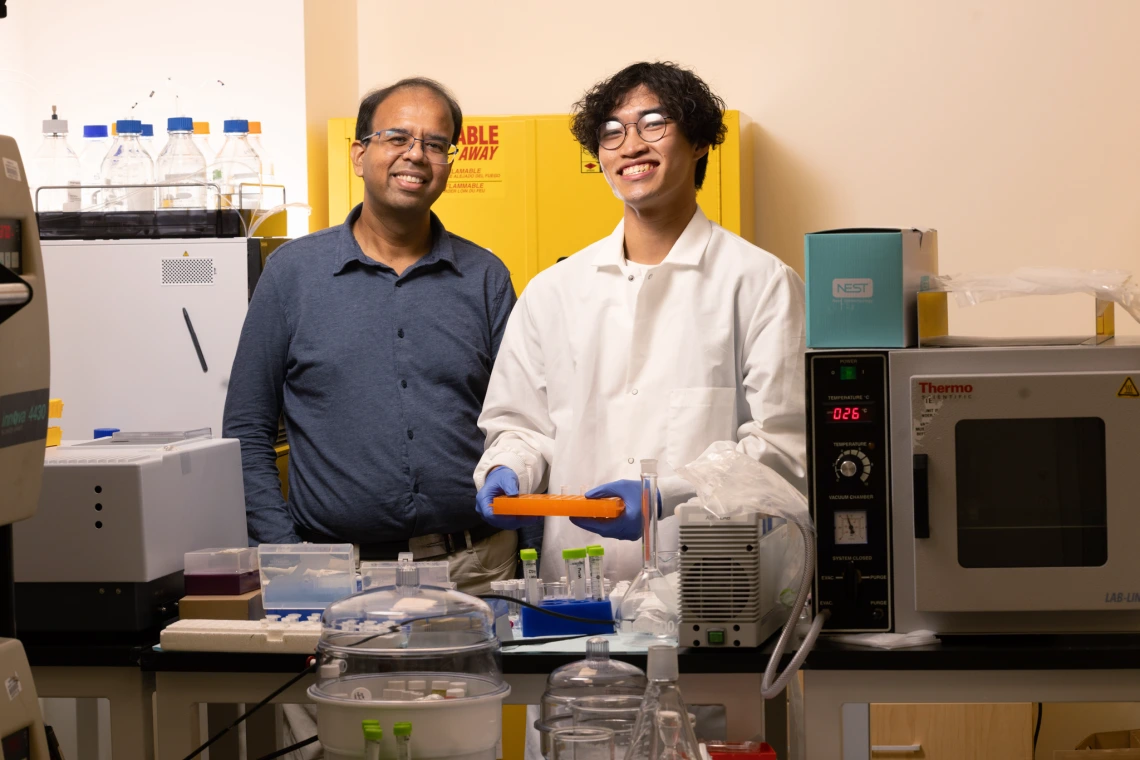A Clearer Vision
Undergraduate researcher Tom Pham is working with his mentor, Abhijit Date, to improve how medicine gets into our eyes.

Tom Pham [R] and mentor, Abhijit Date.
Chris Richards
Eye drops may seem easy to use — until you’re the one trying to use them. You tilt your head back, try not to blink and hope that the drop lands in just the right spot.
Plus, an antibiotic like moxifloxacin, often prescribed for an eye infection or after cataract surgeries, has limited ocular absorption and is quickly cleared by the eye’s natural tear film. As a result, patients often need to apply it up to three times a day, a routine that can lead to frustration and inconsistent use, especially in patients who require long-term ocular antibiotic eyedrops after cataract surgery.
This challenge is the focus of University of Arizona researcher Tom Pham ’25 and his mentor, Abhijit Date, an associate professor of pharmaceutical sciences. Under Date’s leadership, they are converting moxifloxacin into an ionic liquid by combining it with safe, FDA-approved counterions, including those found in the tear film. This strategy improves its penetration into the eye. Efforts are also underway to enhance its retention, aiming for once-daily eye drops and better patient adherence.
“The eye is a beautiful organ, but it’s designed to keep things out,” Pham says. “You have your tears which are always trying to wash everything out. You have the cells in your eyes that are really thick, so it’s really hard to get drugs through and get them to where they need to be.”
Pham began the project as a junior through the U of A’s Undergraduate Biology Research Program (UBRP), which connects undergraduates with mentors to conduct self-directed research. After applying to the program, Pham says, he was handed a list of 200 potential labs.
“It’s kind of like a dating app, where you talk to them and they talk to you, you tell them what you like and they tell you what they want from you,” Pham says. “When I talked to [Date], our conversation stood out because he was the only person who listened to my story.”
“His first question was, ‘So, what can I do for you?’” Pham recalls. “This guy, who’s an esteemed professor, is asking me, Tom Pham, what he can do for me. It’s nuts. It kind of goes to show the kind of person that he is. He leads with such immense compassion. I think that’s how I knew right away that I had to work under him.”
Pham was born in Saigon, Vietnam, and moved to Mesa, Arizona, at 14. When he enrolled at the U of A, becoming a pharmaceutical researcher was not his plan. But he quickly discovered that through science he could channel his curiosity, something he says often got him into trouble as a kid.
“I’ve always been a curious kid, and I think it got me into more trouble than I was worried about,” Pham says. “I was always skipping school and exploring the city I lived in. I was building stuff out of scrap. When I started college, science gave me so much direction and a whole tool set I can use to fulfill that curiosity.”
Conducting research also gave him a way to positively impact others, a value he says was instilled in him by his parents.
"My parents motivated me to recognize my unique gifts and channel it into uplifting others," he says. "In our research, we are harnessing nanotechnology to significantly change how medicine is accessible, especially to the most underserved communities across the world. I'm incredibly lucky to do something that feels like an extension of my values and informs my career aspirations."
Date, a pharmaceutical scientist by training, completed his undergraduate, graduate and doctoral work at the University of Mumbai before coming to the United States 15 years ago to pursue postdoctoral research in drug development and delivery. Since then, he has led research on nanomedicines and drug repurposing, earning both patents and national recognition.
For Date, being involved in UBRP is a way of paying forward his own experience as a mentee during his undergraduate years.
“I was fortunate enough to have undergrad mentors who really believed in whatever ideas I had,” Date says. “Mentors play a critical role in your life, especially in your formative years, in my opinion. If you get the right mentors at the right time, I think that can go really a long way.”
Pham plans to apply to medical school in the coming years, but he says Date’s guidance will stay with him forever. For Date, seeing students like Pham develop through research is what he finds most meaningful.
“Research teaches you perseverance and patience beyond techniques and logic,” Date says. “You could use any of these qualities in whichever stream that you choose. I look at it from a broad experience perspective. If they continue research, that’s wonderful, but as long as they enjoy their time in the lab and use some of the learning experiences for their next journey, I’m more than happy.”
